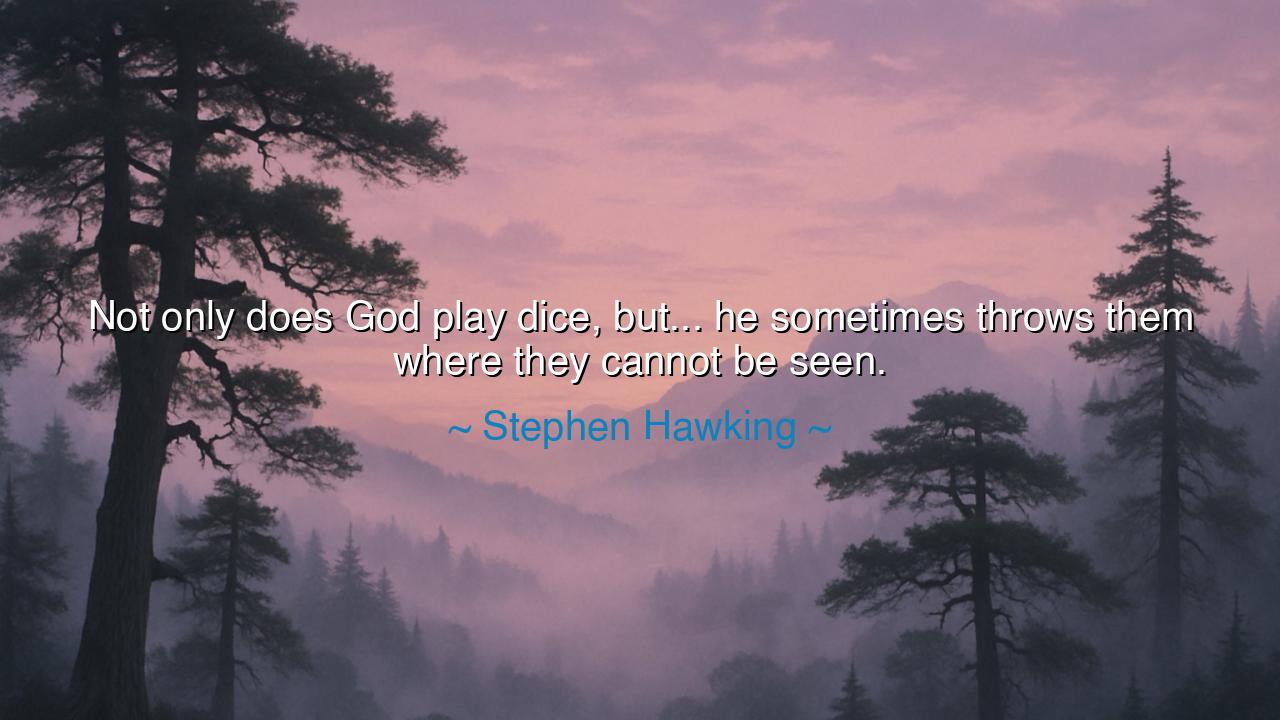
Not only does God play dice, but... he sometimes throws them
Not only does God play dice, but... he sometimes throws them where they cannot be seen.






The quote “Not only does God play dice, but... He sometimes throws them where they cannot be seen” was spoken by Stephen Hawking, one of the most brilliant minds of the modern age, a physicist who spent his life unraveling the mysteries of the cosmos. These words are a powerful echo — both playful and profound — of a long-standing debate that began with Albert Einstein, who once declared, “God does not play dice with the universe.” Einstein believed that creation was governed by order and certainty, not chance. Hawking, however, looked deeper into the heart of quantum mechanics and saw a universe pulsing with mystery, unpredictability, and hidden purpose. His reply was not a denial of God, but an acknowledgment of the divine complexity — that the Creator’s ways are not chaos, but a kind of order too vast for human sight.
When Hawking said that God throws the dice where they cannot be seen, he spoke of the veil that covers the deepest workings of reality. In the world of the very small — the quantum realm — particles dance in patterns we cannot predict. They vanish and appear, move as both waves and points, defying the logic of human thought. Hawking’s words remind us that even science, for all its discoveries, meets the same boundary that mystics have known for millennia: the limit of human understanding. There are truths too subtle, too grand, for us to perceive. The dice are thrown, but they fall in shadows beyond our reach.
This quote reveals a paradox both scientific and spiritual. On one hand, it speaks of uncertainty — the fact that life and the universe are not fully predictable. On the other, it invites humility, for even the greatest intellect must bow before mystery. The ancients spoke of the same idea in different words. The philosopher Heraclitus said, “The hidden harmony is better than the visible.” What seems random to us may be music we cannot yet hear. Hawking’s insight mirrors that ancient wisdom: the unknown is not empty; it is full of divine intelligence waiting to be revealed.
Consider the story of Isaac Newton, who uncovered the laws of motion and gravitation. He saw a universe of perfect mathematical order — planets obeying divine geometry, every action balanced by reaction. But centuries later, physicists like Hawking discovered that beneath that smooth surface lay a sea of uncertainty. Newton’s equations could describe the paths of stars, but not the restless hearts of atoms. The cosmos, it seemed, had both structure and mystery, both law and liberty. And this, Hawking suggested, is precisely what makes existence magnificent — that even in randomness, there may dwell a hidden purpose.
In human life, too, we experience these unseen dice. Sometimes we strive, plan, and pray, yet events unfold in ways beyond comprehension. We ask why misfortune strikes the innocent, why beauty fades, why hope sometimes arrives disguised as loss. To this, Hawking’s metaphor offers comfort and truth: we cannot always see where the dice fall, but that does not mean there is no meaning. The hidden rolls of destiny may one day reveal patterns that make sense only in eternity’s light.
Thus, this quote is not merely about science — it is a meditation on faith amid uncertainty. It teaches that knowledge and mystery are not enemies but companions. To live wisely is to accept that not everything is meant to be understood. The unseen hand of the divine may work through chance, guiding creation with precision that surpasses human reason. The dice of God do not mock us; they remind us that existence is far greater than our calculations.
The lesson is timeless: we must learn to trust in the unseen — in both the cosmos and our own lives. The unknown is not to be feared but revered, for it is the dwelling place of wonder. The stars, the atoms, the choices we make, all dance to a rhythm older than time. Faith, then, is not blindness, but courage in mystery.
Practical actions: When uncertainty grips you, resist the urge to despair. Instead, pause and remember that life’s hidden patterns may yet reveal their beauty. Cultivate curiosity — study, question, learn — but also embrace mystery. In your work, in your suffering, in your love, see the unseen dice as the symbol of divine depth. Walk forward not demanding to see all, but trusting that even in the unseen throws of fate, the hand of God is still at play — shaping, teaching, and creating worlds within and beyond your sight.






AAdministratorAdministrator
Welcome, honored guests. Please leave a comment, we will respond soon